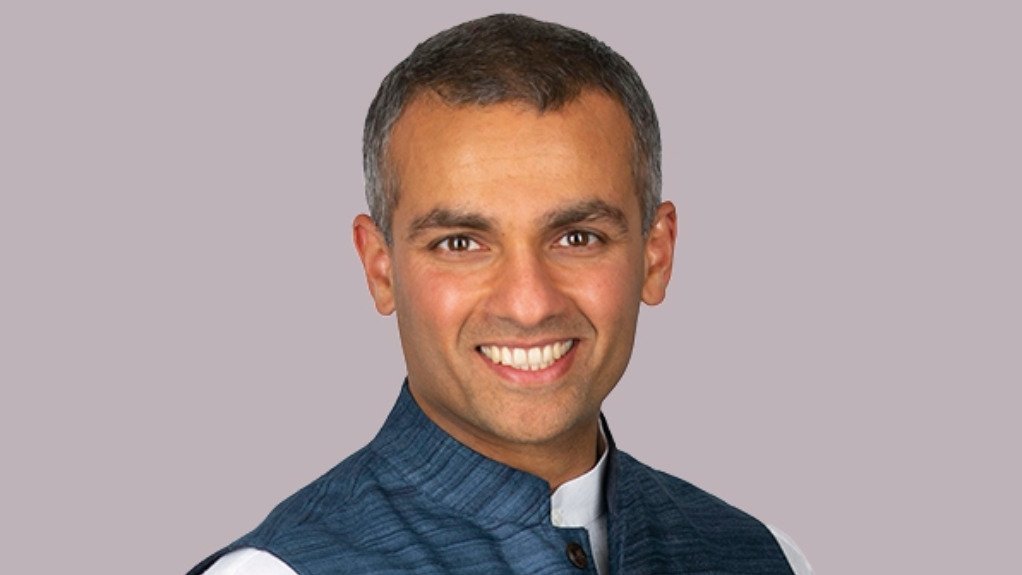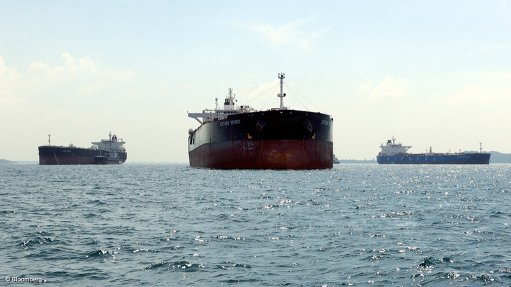ICMM calls for honest, transparent conversations


ROHITESH DHAWAN ICMM CEO Rohitesh Dhawan notes that “green” in the context of mining in Africa does not only mean climate action being undertaken, but also relates to climate-friendly, nature-positive and socially-inclusive initiatives
This year, more than ever, participants of the London Indaba are hoping for honest and transparent conversations that will generate “powerful solutions” to foster responsible mining practices across the African continent, says CEO-led mining and metals industry organisation ICMM CEO Rohitesh Dhawan.
Dhawan, who is scheduled to deliver a keynote address on ‘How to Ensure Responsible Mining Practices’ at the London Indaba, on June 25, stresses that the Indaba is a crucial platform to explore Africa’s role in supplying the critical metals and minerals needed to drive the global energy transition.
While he says Africa is one of the most resource-rich continents in the world with access to cobalt, gold, copper, iron-ore and many others, Dhawan also notes that mining companies operating on the continent face many challenges including limited infrastructure, and regulatory and policy uncertainty.
In addition, many mines in Africa operate in areas where infrastructure is either lacking or in substandard condition, and like in most developing markets, local communities often expect that mining operators will fulfil elevated socioeconomic expectations surrounding jobs, procurement and community investment.
As a result, Dhawan emphasises that these realities require miners operating on the continent to focus well beyond operational issues.
“Mining companies planning to develop a mine need to take these factors into account and plan to make additional investments that would not be required if the mine were located in higher-income jurisdictions,” he explains.
These investments often include transport infrastructure; water and energy provisions, in particular renewable-energy plants; as well as community investments ranging from educational to health facilities.
While these investments can put additional short-term economic pressures on mining companies, Dhawan says that trying to operate in an environment lacking this kind of public infrastructure makes achieving commercial success significantly more difficult.
Green Mining for Africa
Dhawan says that “green” in the context of mining in Africa does not only mean climate action being undertaken by mining companies, but also relates to climate-friendly, nature-positive and socially-inclusive initiatives.
“Any of them in isolation will neither be effective nor appropriate for the nature of the challenges in Africa,” he adds.
In trying to develop and adapt mining operations to be more environment-conscious, Dhawan says African mining companies can typically implement their own energy plants, with a focus on green energy technologies – a common criteria for operations in challenging environments where access to electricity is generally challenging.
Further to this, any surplus power generated by mining operations can be made available to local communities free-of-charge, having built the necessary infrastructure to do so, thereby benefiting their social licence to operate.
The success of this model is exemplified by two ICMM member mines: the Democratic Republic of Congo-based Kibali mine of Barrick Mining, AngloGold Ashanti and Société Miniére de Kilo-Moto; and the South Africa-based South Deep mine of Gold Fields.
Kibali has developed or rehabilitated four hydro-power stations which power the mine in a clean manner and provide vital electricity to local communities, while South Deep derives about 20% of its electricity from the extensive 50 MW Khanyisa solar PV power plant.
The Khanyisa plant provides South Deep with secure and significantly cheaper electricity than that available through State-owned electricity supplier Eskom.
Negotiations are ongoing to supply surplus electricity from Khanyisa to adjacent informal settlements, while the mine looks to expand the plant’s capacity over the next year.
Structured Frameworks Needed
While Dhawan says current legislative and regulatory frameworks across many African countries provide a foundational structure for responsible mining, in most cases he says the frameworks are fragmented, inconsistently enforced, and are often outdated in relation to evolving global sustainability expectations.
Therefore, a combined commitment from companies to use credible voluntary standards of responsible mining, and for governments to apply a minimum baseline of good practice, are key factors to build and maintain public support for the sector.
“Combined commitments from companies and governments is the surest way of guaranteeing that the rush for critical minerals doesn’t trample on the rights of people or the health of our environment,” Dhawan emphasises.
In this regard, Dhawan points to the Consolidated Mining Standard Initiative (CMSI), which is currently under development, being a “game changer”, as it unifies the strongest elements of four leading frameworks into a consolidated global standard, governed by an independent, shared board drawn from a variety of stakeholders.
Dhawan reports the CMSI is close to finalisation and sets clear, high-level expectations for responsible mining practices, regardless of company size, commodity or location.
Article Enquiry
Email Article
Save Article
Feedback
To advertise email advertising@creamermedia.co.za or click here
Announcements
What's On
Subscribe to improve your user experience...
Option 1 (equivalent of R125 a month):
Receive a weekly copy of Creamer Media's Engineering News & Mining Weekly magazine
(print copy for those in South Africa and e-magazine for those outside of South Africa)
Receive daily email newsletters
Access to full search results
Access archive of magazine back copies
Access to Projects in Progress
Access to ONE Research Report of your choice in PDF format
Option 2 (equivalent of R375 a month):
All benefits from Option 1
PLUS
Access to Creamer Media's Research Channel Africa for ALL Research Reports, in PDF format, on various industrial and mining sectors
including Electricity; Water; Energy Transition; Hydrogen; Roads, Rail and Ports; Coal; Gold; Platinum; Battery Metals; etc.
Already a subscriber?
Forgotten your password?
Receive weekly copy of Creamer Media's Engineering News & Mining Weekly magazine (print copy for those in South Africa and e-magazine for those outside of South Africa)
➕
Recieve daily email newsletters
➕
Access to full search results
➕
Access archive of magazine back copies
➕
Access to Projects in Progress
➕
Access to ONE Research Report of your choice in PDF format
RESEARCH CHANNEL AFRICA
R4500 (equivalent of R375 a month)
SUBSCRIBEAll benefits from Option 1
➕
Access to Creamer Media's Research Channel Africa for ALL Research Reports on various industrial and mining sectors, in PDF format, including on:
Electricity
➕
Water
➕
Energy Transition
➕
Hydrogen
➕
Roads, Rail and Ports
➕
Coal
➕
Gold
➕
Platinum
➕
Battery Metals
➕
etc.
Receive all benefits from Option 1 or Option 2 delivered to numerous people at your company
➕
Multiple User names and Passwords for simultaneous log-ins
➕
Intranet integration access to all in your organisation


















